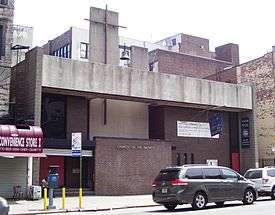Church of the Nativity (Manhattan)
Coordinates: 40°43′30.7″N 73°59′23.4″W / 40.725194°N 73.989833°W
| The Church of the Nativity | |
|---|---|
|
c.1865 | |
| General information | |
| Architectural style |
1832 building: Greek Revival 1970 building: Modernist |
| Town or city | Manhattan, New York City |
| Country | US |
| Construction started | 1968 (for church)[1] |
| Completed | 1970[2] |
| Demolished | 1970[2] |
| Cost | $240,000 (for 1968 church)[1] |
| Client | Roman Catholic Archdiocese of New York |
| Design and construction | |
| Architect |
1832 building: Town & Davis (Alexander Jackson Davis, J. H. Dakin, and James Gallier)[2] 1970 building: Genovese & Maddalene[1] |
The Church of the Nativity is a former Roman Catholic parish church in the Roman Catholic Archdiocese of New York, located at 44 Second Avenue between Second and 3rd Streets in the East Village neighborhood of Manhattan, New York City. It was established in 1842 and was formerly staffed by the Jesuit Fathers.[3]
In November 2014, the archdiocese announced that the Church of the Nativity was one of 31 of its parishes which would be merged with other parishes.[4] Nativity Parish was merged into Most Holy Redeemer Parish at 173 East 3rd Street and the church was being reduced to a mission church of the parish.[5]
Buildings

The original painted-timber Greek Revival sanctuary was built in 1832 at 48 Second Avenue[6] as the Second Avenue Presbyterian Church[7] and was designed by the prominent New York firm of Town & Davis, which then included Alexander Jackson Davis, J. H. Dakin, and James Gallier. It consisted of a Greek Doric portico and two-stage steeple.[2] In 1842, it was sold to the newly formed Nativity of Our Lord parish and became the Church of the Nativity.[7] It was demolished in 1970.[8]
The present Modernist church was built from 1968[7] to 1970[2][8] for $240,000 to the designs of Genovese & Maddalene.[1] It has been described as "starkly institutional"[7] and "a modern architectural cartoon exhibiting a gross idea with no detail."[8]
The parish included within its territory the headquarters of the Catholic Worker Movement and was the site of the Funeral Mass of its co-founder, Dorothy Day, in December 1980.[9]
References
Notes
- 1 2 3 4 Office for Metropolitan History, "Manhattan NB Database 1900-1986," (Accessed 25 Dec 2010).
- 1 2 3 4 5 White, Norval; Willensky, Elliot; Leadon, Fran (2010). AIA Guide to New York City. American Institute of Architects New York Chapter (Fifth ed.). Oxford: Oxford University Press. p. 202. ISBN 978-0-19-538386-7.
- ↑ Lafort, Remigius Lafort The Catholic Church in the United States of America: Undertaken to Celebrate the Golden Jubilee of His Holiness, Pope Pius X. Volume 3: The Province of Baltimore and the Province of New York, Section 1: Comprising the Archdiocese of New York and the Diocese of Brooklyn, Buffalo and Ogdensburg Together with some Supplementary Articles on Religious Communities of Women.. New York City: The Catholic Editing Company, 1914. p.352.
- ↑ Otterman, Sharon. "Tears and Heartache for New York’s Catholics as Cardinal Shuts Churches" The New York Times (November 2, 2014)
- ↑ "List of Merging Churches and Those That Will Cease Regular Services" The New York Times (November 2, 2014)
- ↑ The World Almanac 1892 and Book of Facts (New York: Press Publishing, 1892), p.390.
- 1 2 3 4 Dunlap, David W. (2004). From Abyssinian to Zion: A Guide to Manhattan's Houses of Worship. New York: Columbia University Press. ISBN 0-231-12543-7., p.156
- 1 2 3 White, Norval & Willensky, Elliot (2000), AIA Guide to New York City (4th ed.), New York: Three Rivers Press, ISBN 978-0-8129-3107-5, p.170
- ↑ Gnuhs, Geoffrey P., O.P. (January 1981). "Eulogy at the Funeral of Dorothy Day". The Catholic Worker.
External links
 Media related to Church of the Nativity (Manhattan) at Wikimedia Commons
Media related to Church of the Nativity (Manhattan) at Wikimedia Commons

